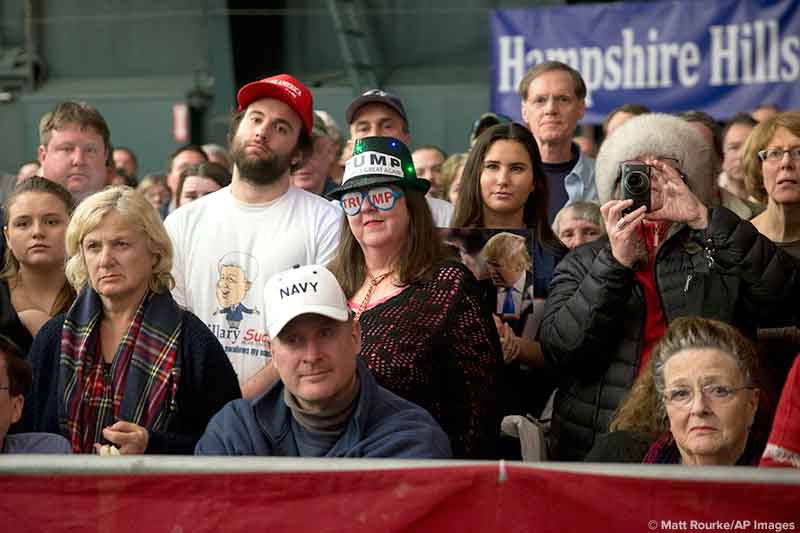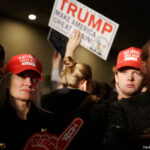
Attendees listen to Republican presidential candidate Donald Trump speak during a campaign stop Tuesday, Feb. 2, 2016, in Milford, N.H. © Matt Rourke/AP Images. http://www.apimages.com/Search?query=326182678720&ss=10&st=kw&entitysearch=&toItem=15&orderBy=Oldest.
Attendees listen at a Trump campaign stop in Milford, New Hampshire. Credit: © Matt Rourke/AP Images
After Iowa: Who Won, Who’s Out, What’s Next
Last week, Election Central explained how the Iowa caucus works. Now that you understand how it functions, lets take a look at how the events on the campaign trail have shaken down in recent days. Then we’ll see what’s ahead on the political horizon.
A Trumpless Debate
Just days before Iowa citizens began their caucus, the GOP held its seventh debate of the season. Only eight candidates qualified to participate, by achieving at least one percent in the five most recent national polls. Frontrunner Donald Trump declined the invitation. Instead, he filled an auditorium three miles away with 700 supporters for a so-called rally for veterans. However, many took the gathering as another publicity stunt.
Cruz Cruises Ahead
Even though Trump had been leading in the polls, Cruz’s last-minute victory surge wasn’t a big surprise. In the end, Cruz took 28 percent of the Iowa precincts. Trump claimed 24 percent and Rubio gathered an impressive 23 percent. There was a wide gap between the remaining candidates.
Republican voters in Iowa tend to be more religious and deeply conservative than those across the country and Cruz appealed to evangelicals. A defiant Cruz took a stab at the media and the “Washington establishment” while making an acceptance speech.
Hillary by a Hair
The Bernie Sanders campaign had been gaining momentum in Iowa in recent weeks. Still few would have predicted early on just how much “the Bern” would catch up. In the end, Hillary Clinton got 49.9% of the vote and Bernie Sanders 49.6%, making it the closest race in the history of the Iowa caucus. Despite the hair-thin lead, the Clinton camp is relieved to be able to claim the victory, especially since she lost to then-candidate Obama back in 2008.
O’Malley Says Goodbye
After failing to gain any significant support for his underdog candidacy, Martin O’Malley suspended his campaign shortly after the polls closed on February 1. Despite spending more time in Iowa than his contenders, the former governor of Maryland remained a distant third.
Historically, Republicans have had a challenge in going from one of the most conservative states to more moderate ones. Former pastor Mike Huckabee won in Iowa in 2008 but only won seven other states; similarly, staunch conservative Rick Santorum took the votes in 2012 but only gained three more states before suspending his campaign.
Many eyes will be on Marco Rubio, who finished an impressive third place. Of course, attention may not shift away from Trump any time soon.
Going forward, the biggest gap in Democratic voters seems to be in age. In Iowa, 84 percent of voters 17-29 voted for Bernie Sanders, while 14 percent cast a vote for Hillary Clinton.
So far, religiously unaffiliated voters are leaning toward Sanders, while black Protestants are showing support for Clinton. A recent CNN poll of registered New Hampshire voters show Sanders with a significant lead over Clinton (58 percent to 34 percent).
Dig Deeper
Look ahead to New Hampshire. Find out if the narrowed field or voter demographic has made any significant impact on the polls. Predict a winner and follow the coverage through until February 8.
David Martin



